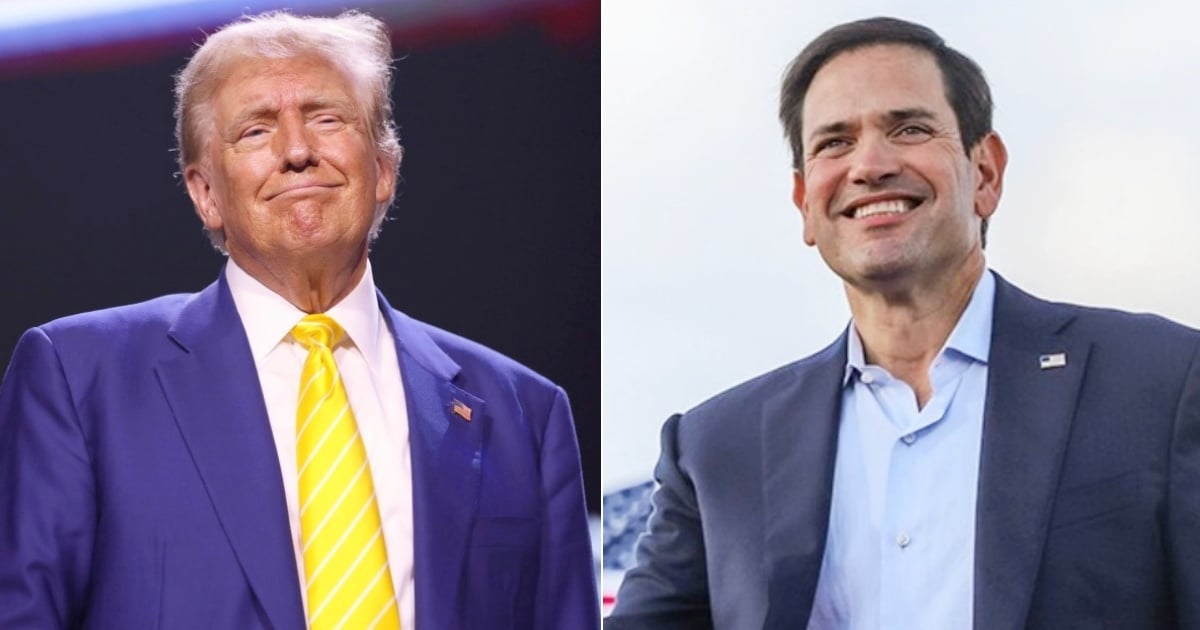
The elected President of the United States, Donald Trump, is reportedly considering offering the Secretary of State position to Cuban-American Senator Marco Rubio, as the New York Times has indicated.
Although the decision could still be changed, sources close to Trump assert that Rubio, 53, is a strong candidate for that influential position, partly due to his experience and the symbolism he represents as a Latino leader within the Republican Party.
If confirmed, Rubio would be the first Latino to lead U.S. diplomacy, a decision that could impact the Hispanic community in the United States and the foreign policy of the incoming administration.
Although the appointment is not official yet, some reactions to the nomination are starting to come to light, including that of Cuban-American Congresswoman María Elvira Salazar.
Foreign policy with influence in Latin America
Elected to the Senate in 2010, Marco Rubio has stood out as a "hawk" in foreign policy, known for his strong positions against nations like China and Iran.
His positions have earned him the support of conservative sectors that see him as a defender of national security and a key figure in maintaining an aggressive foreign policy.
Furthermore, Rubio has been a staunch critic of regimes such as those in Venezuela, Cuba, and Nicaragua, advocating for sanctions and restrictions aimed at weakening these authoritarian governments in Latin America.
According to U.S. media, the Trump administration believes that having Rubio at the helm of the State Department would strengthen its approach to Latin America.
Rubio, who speaks Spanish fluently, could serve as a liaison in the region, supporting strategic objectives of the White House and seeking to strengthen alliances with countries that share democratic values.
A history of confrontation with Trump
The potential appointment of Rubio also has a political background, as the relationship between the two has not always been smooth.
During the 2016 Republican primaries, Trump and Rubio engaged in a series of hostile exchanges, with the then-presidential candidate calling the senator "Little Marco."
However, over time, Rubio has gradually risen in Trump's orbit and has become an ally on several key issues, leading to him even being considered a potential vice president in the incoming administration.
Despite these past tensions, the senator has managed to maintain his influence in the Republican Party, particularly on foreign policy matters, as a member of the Senate Foreign Relations Committee.
His appointment to head the State Department would signal a significant political reconciliation between the two and solidify his position within Trump's inner circle.
The importance of the Latino vote and the symbolic message of the election
Rubio's selection as Secretary of State could send a symbolic message to the Latino community in the United States, a demographic that represented approximately 15% of the electorate in the last election.
Despite Trump's controversial rhetoric on immigration, the administration seems to recognize the importance of Hispanic voters, particularly in states like Florida, where Rubio has maintained a strong base of support.
Including Marco Rubio in the cabinet would allow Trump to connect with the Latino community and enhance his image among this group by demonstrating a willingness to integrate Hispanic leaders into high-level positions.
A Tough Foreign Policy: China, Russia, and the Conflict in Ukraine
Rubio has taken a tough stance against the geopolitical rivals of the United States, such as China and Russia.
Regarding the conflict in Ukraine, the Cuban-American senator has stated in interviews that, while he does not support Russia, he believes the war will end with a negotiated agreement, suggesting a diplomatic route to resolve the conflict.
In September, he stated to NBC: “The reality is that the way the war in Ukraine will end is with a negotiated agreement.”
Rubio also voted against a $95 billion military aid package for Ukraine, arguing that the country should explore diplomatic alternatives to resolve the conflict.
Regarding the situation in Gaza, Rubio has maintained a distinctly pro-Israel stance. Last November, when clashes erupted, Marco Rubio opposed a ceasefire and strongly defended Israel.
Although Rubio largely aligns with Trump's hardline stance on foreign policy, some advisors have pointed out that his "hawk" profile could conflict with the "America first" vision promoted by the elected president.
Trump's isolationist stance prioritizes national interests over international interventions, which contrasts with Rubio's more interventionist approach, advocating for a U.S. presence and leadership on the global stage.
The foreign policy of the new government will confront a global landscape marked by multiple tensions: the war in Ukraine, the rising influence of China in Asia, and the alliances between Russia, Iran, and China.
Trump has promised that his administration will make the United States a "feared" power on the global stage, claiming that rivals such as Russia and China have strengthened under Joe Biden's presidency. However, Trump maintains a close relationship with Russian President Vladimir Putin, with whom he has communicated after leaving the White House, a fact that has drawn criticism from both domestic and international sectors.
Amid an increasingly unstable international environment, Rubio's potential appointment could be crucial in shaping how the United States navigates its foreign relations, promoting a firm policy aligned with the conservative values that both leaders seek to project to the world.
Filed under: